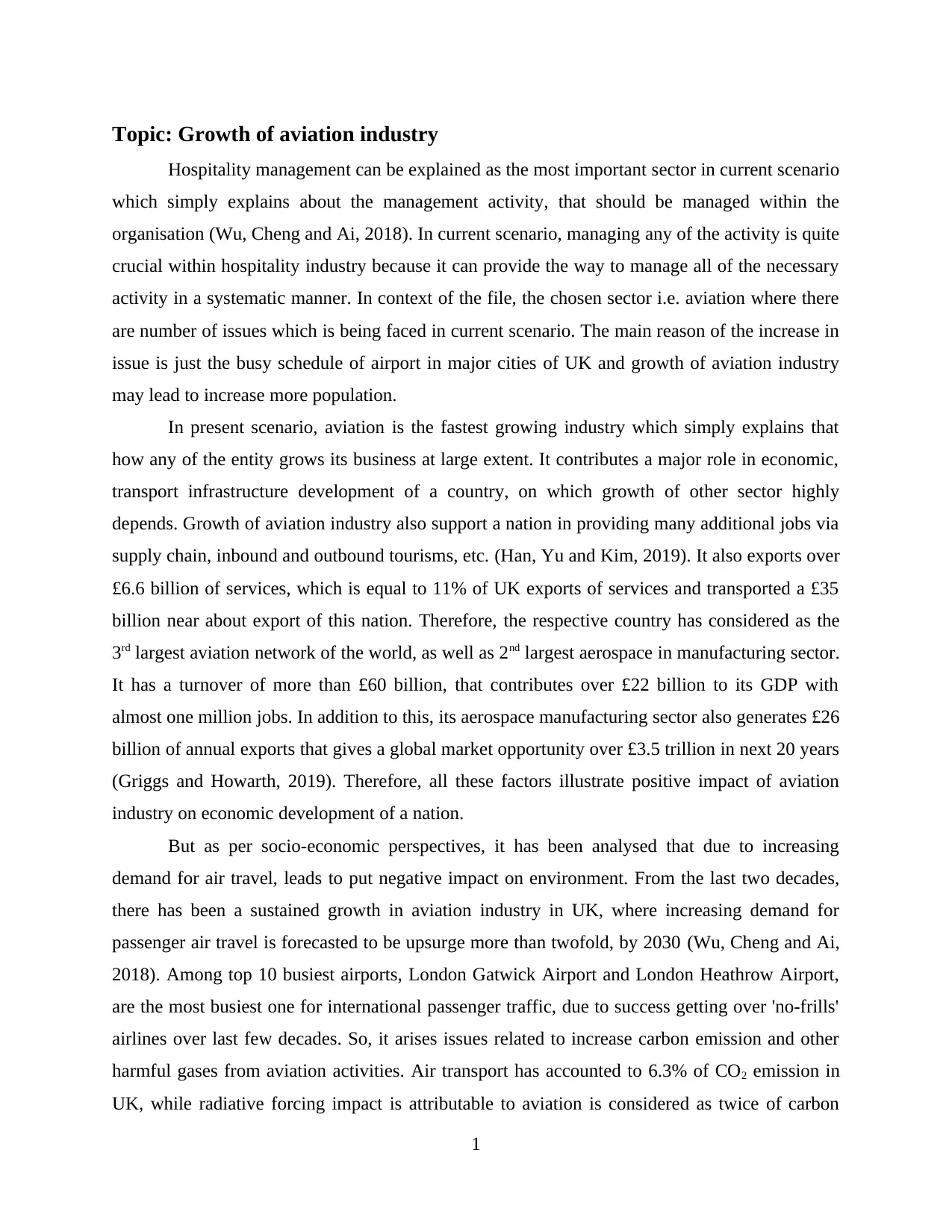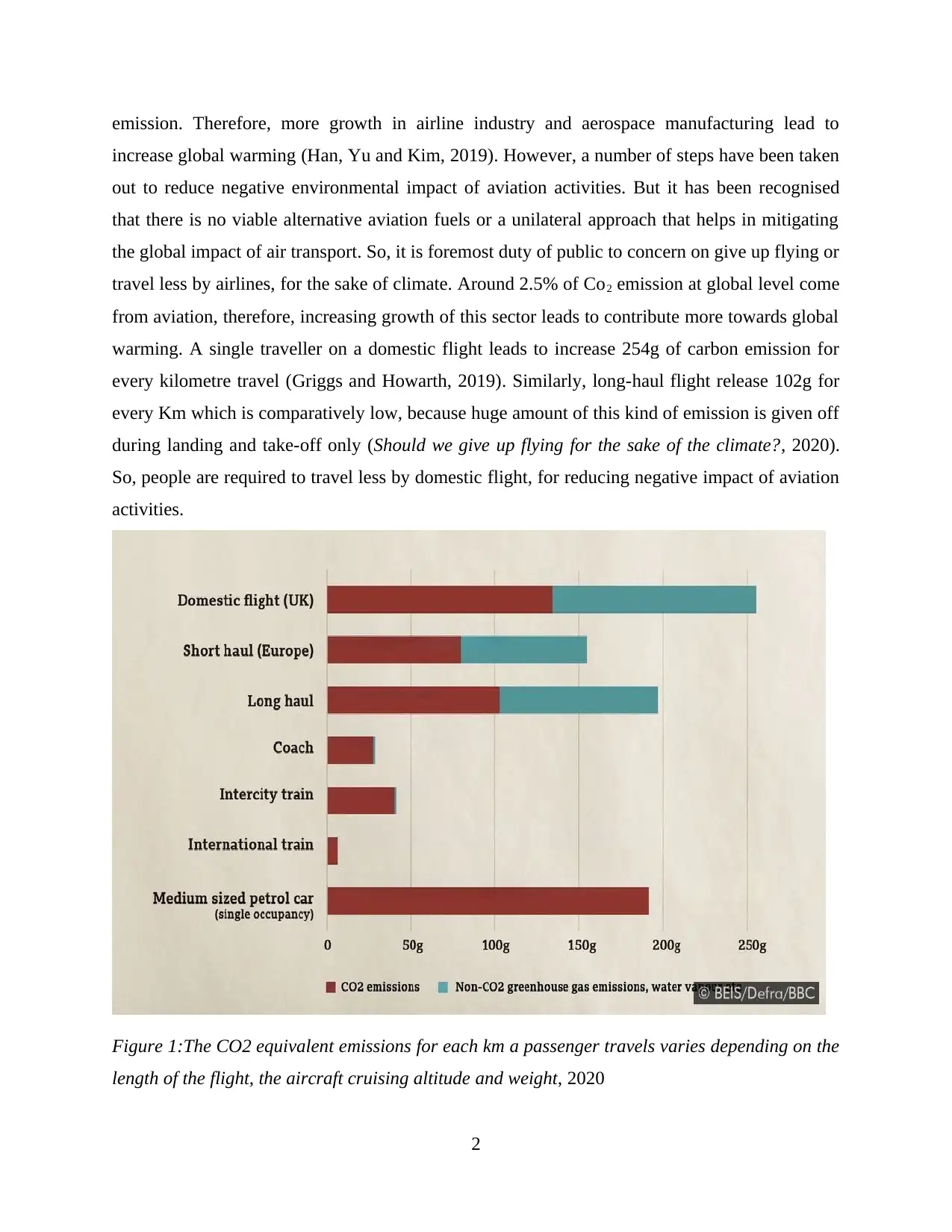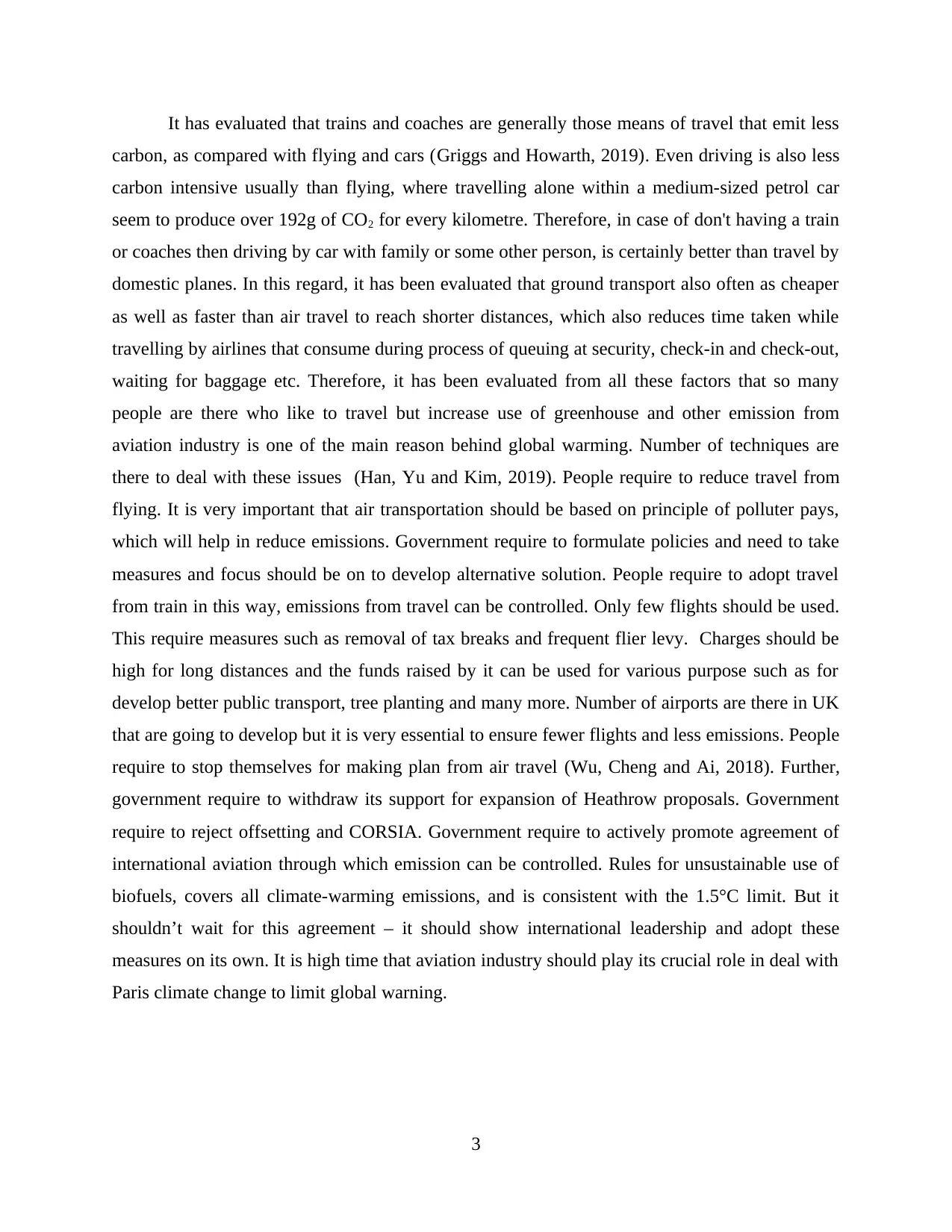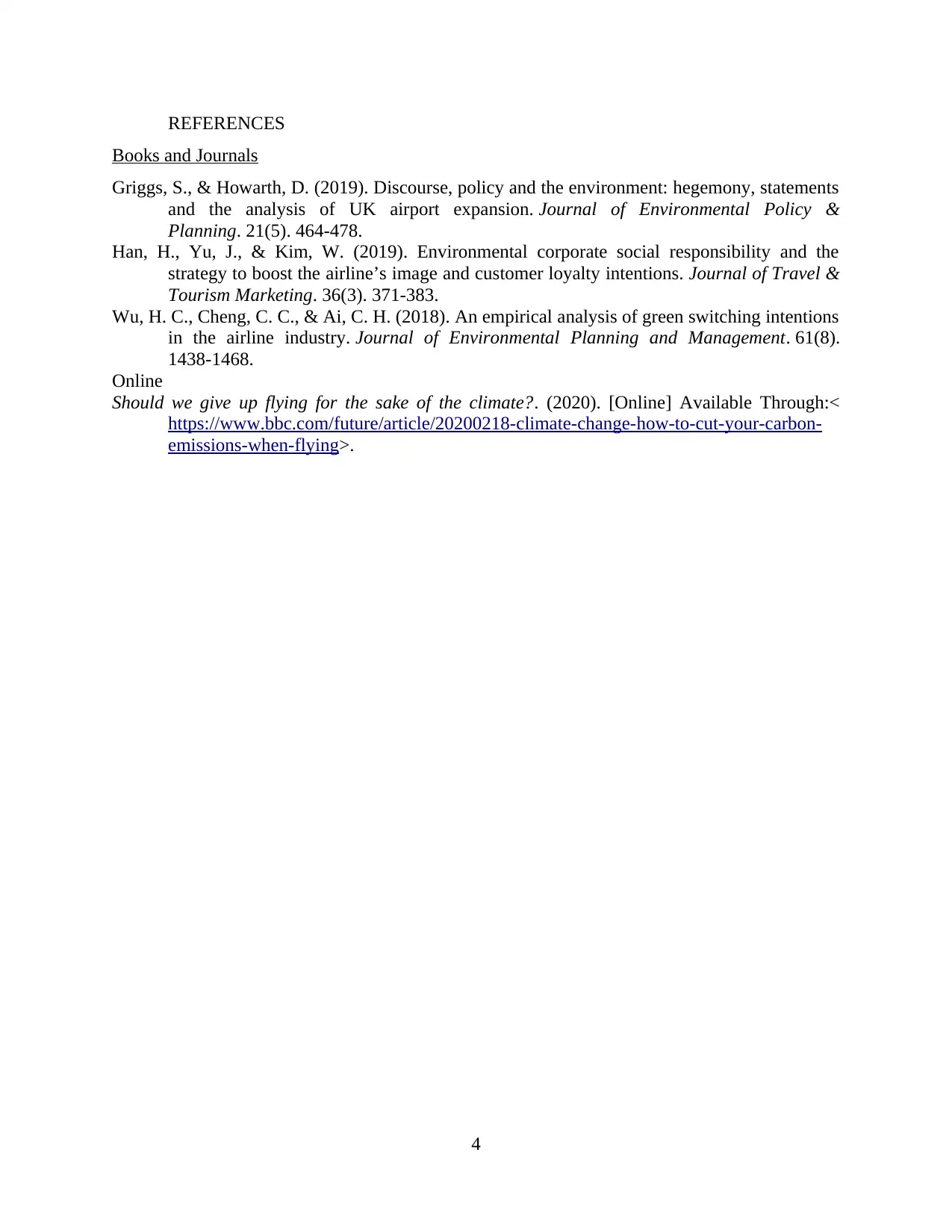Global Hospitality and Tourism Issues: Aviation Industry Growth Report
VerifiedAdded on 2023/01/09
|6
|1426
|21
Report
AI Summary
This report explores the growth of the aviation industry, emphasizing its significant role in economic development and transport infrastructure. It highlights the industry's contribution to job creation, exports, and GDP, particularly in the UK. However, the report also addresses the negative environmental consequences of aviation, such as increased carbon emissions and global warming due to the rising demand for air travel. It examines the impact of busy airports and the forecasted increase in passenger air travel. The report analyzes the carbon footprint of air travel compared to other modes of transport and discusses various strategies to mitigate the environmental impact, including reducing air travel, implementing the 'polluter pays' principle, government policies, and the development of alternative solutions. The report emphasizes the need for individuals, governments, and the aviation industry to collaborate and take proactive measures to address climate change and promote sustainable practices.

Hospitality
Management
Management
Paraphrase This Document
Need a fresh take? Get an instant paraphrase of this document with our AI Paraphraser


Topic: Growth of aviation industry
Hospitality management can be explained as the most important sector in current scenario
which simply explains about the management activity, that should be managed within the
organisation (Wu, Cheng and Ai, 2018). In current scenario, managing any of the activity is quite
crucial within hospitality industry because it can provide the way to manage all of the necessary
activity in a systematic manner. In context of the file, the chosen sector i.e. aviation where there
are number of issues which is being faced in current scenario. The main reason of the increase in
issue is just the busy schedule of airport in major cities of UK and growth of aviation industry
may lead to increase more population.
In present scenario, aviation is the fastest growing industry which simply explains that
how any of the entity grows its business at large extent. It contributes a major role in economic,
transport infrastructure development of a country, on which growth of other sector highly
depends. Growth of aviation industry also support a nation in providing many additional jobs via
supply chain, inbound and outbound tourisms, etc. (Han, Yu and Kim, 2019). It also exports over
£6.6 billion of services, which is equal to 11% of UK exports of services and transported a £35
billion near about export of this nation. Therefore, the respective country has considered as the
3rd largest aviation network of the world, as well as 2nd largest aerospace in manufacturing sector.
It has a turnover of more than £60 billion, that contributes over £22 billion to its GDP with
almost one million jobs. In addition to this, its aerospace manufacturing sector also generates £26
billion of annual exports that gives a global market opportunity over £3.5 trillion in next 20 years
(Griggs and Howarth, 2019). Therefore, all these factors illustrate positive impact of aviation
industry on economic development of a nation.
But as per socio-economic perspectives, it has been analysed that due to increasing
demand for air travel, leads to put negative impact on environment. From the last two decades,
there has been a sustained growth in aviation industry in UK, where increasing demand for
passenger air travel is forecasted to be upsurge more than twofold, by 2030 (Wu, Cheng and Ai,
2018). Among top 10 busiest airports, London Gatwick Airport and London Heathrow Airport,
are the most busiest one for international passenger traffic, due to success getting over 'no-frills'
airlines over last few decades. So, it arises issues related to increase carbon emission and other
harmful gases from aviation activities. Air transport has accounted to 6.3% of CO2 emission in
UK, while radiative forcing impact is attributable to aviation is considered as twice of carbon
1
Hospitality management can be explained as the most important sector in current scenario
which simply explains about the management activity, that should be managed within the
organisation (Wu, Cheng and Ai, 2018). In current scenario, managing any of the activity is quite
crucial within hospitality industry because it can provide the way to manage all of the necessary
activity in a systematic manner. In context of the file, the chosen sector i.e. aviation where there
are number of issues which is being faced in current scenario. The main reason of the increase in
issue is just the busy schedule of airport in major cities of UK and growth of aviation industry
may lead to increase more population.
In present scenario, aviation is the fastest growing industry which simply explains that
how any of the entity grows its business at large extent. It contributes a major role in economic,
transport infrastructure development of a country, on which growth of other sector highly
depends. Growth of aviation industry also support a nation in providing many additional jobs via
supply chain, inbound and outbound tourisms, etc. (Han, Yu and Kim, 2019). It also exports over
£6.6 billion of services, which is equal to 11% of UK exports of services and transported a £35
billion near about export of this nation. Therefore, the respective country has considered as the
3rd largest aviation network of the world, as well as 2nd largest aerospace in manufacturing sector.
It has a turnover of more than £60 billion, that contributes over £22 billion to its GDP with
almost one million jobs. In addition to this, its aerospace manufacturing sector also generates £26
billion of annual exports that gives a global market opportunity over £3.5 trillion in next 20 years
(Griggs and Howarth, 2019). Therefore, all these factors illustrate positive impact of aviation
industry on economic development of a nation.
But as per socio-economic perspectives, it has been analysed that due to increasing
demand for air travel, leads to put negative impact on environment. From the last two decades,
there has been a sustained growth in aviation industry in UK, where increasing demand for
passenger air travel is forecasted to be upsurge more than twofold, by 2030 (Wu, Cheng and Ai,
2018). Among top 10 busiest airports, London Gatwick Airport and London Heathrow Airport,
are the most busiest one for international passenger traffic, due to success getting over 'no-frills'
airlines over last few decades. So, it arises issues related to increase carbon emission and other
harmful gases from aviation activities. Air transport has accounted to 6.3% of CO2 emission in
UK, while radiative forcing impact is attributable to aviation is considered as twice of carbon
1
⊘ This is a preview!⊘
Do you want full access?
Subscribe today to unlock all pages.

Trusted by 1+ million students worldwide

emission. Therefore, more growth in airline industry and aerospace manufacturing lead to
increase global warming (Han, Yu and Kim, 2019). However, a number of steps have been taken
out to reduce negative environmental impact of aviation activities. But it has been recognised
that there is no viable alternative aviation fuels or a unilateral approach that helps in mitigating
the global impact of air transport. So, it is foremost duty of public to concern on give up flying or
travel less by airlines, for the sake of climate. Around 2.5% of Co2 emission at global level come
from aviation, therefore, increasing growth of this sector leads to contribute more towards global
warming. A single traveller on a domestic flight leads to increase 254g of carbon emission for
every kilometre travel (Griggs and Howarth, 2019). Similarly, long-haul flight release 102g for
every Km which is comparatively low, because huge amount of this kind of emission is given off
during landing and take-off only (Should we give up flying for the sake of the climate?, 2020).
So, people are required to travel less by domestic flight, for reducing negative impact of aviation
activities.
Figure 1:The CO2 equivalent emissions for each km a passenger travels varies depending on the
length of the flight, the aircraft cruising altitude and weight, 2020
2
increase global warming (Han, Yu and Kim, 2019). However, a number of steps have been taken
out to reduce negative environmental impact of aviation activities. But it has been recognised
that there is no viable alternative aviation fuels or a unilateral approach that helps in mitigating
the global impact of air transport. So, it is foremost duty of public to concern on give up flying or
travel less by airlines, for the sake of climate. Around 2.5% of Co2 emission at global level come
from aviation, therefore, increasing growth of this sector leads to contribute more towards global
warming. A single traveller on a domestic flight leads to increase 254g of carbon emission for
every kilometre travel (Griggs and Howarth, 2019). Similarly, long-haul flight release 102g for
every Km which is comparatively low, because huge amount of this kind of emission is given off
during landing and take-off only (Should we give up flying for the sake of the climate?, 2020).
So, people are required to travel less by domestic flight, for reducing negative impact of aviation
activities.
Figure 1:The CO2 equivalent emissions for each km a passenger travels varies depending on the
length of the flight, the aircraft cruising altitude and weight, 2020
2
Paraphrase This Document
Need a fresh take? Get an instant paraphrase of this document with our AI Paraphraser

It has evaluated that trains and coaches are generally those means of travel that emit less
carbon, as compared with flying and cars (Griggs and Howarth, 2019). Even driving is also less
carbon intensive usually than flying, where travelling alone within a medium-sized petrol car
seem to produce over 192g of CO2 for every kilometre. Therefore, in case of don't having a train
or coaches then driving by car with family or some other person, is certainly better than travel by
domestic planes. In this regard, it has been evaluated that ground transport also often as cheaper
as well as faster than air travel to reach shorter distances, which also reduces time taken while
travelling by airlines that consume during process of queuing at security, check-in and check-out,
waiting for baggage etc. Therefore, it has been evaluated from all these factors that so many
people are there who like to travel but increase use of greenhouse and other emission from
aviation industry is one of the main reason behind global warming. Number of techniques are
there to deal with these issues (Han, Yu and Kim, 2019). People require to reduce travel from
flying. It is very important that air transportation should be based on principle of polluter pays,
which will help in reduce emissions. Government require to formulate policies and need to take
measures and focus should be on to develop alternative solution. People require to adopt travel
from train in this way, emissions from travel can be controlled. Only few flights should be used.
This require measures such as removal of tax breaks and frequent flier levy. Charges should be
high for long distances and the funds raised by it can be used for various purpose such as for
develop better public transport, tree planting and many more. Number of airports are there in UK
that are going to develop but it is very essential to ensure fewer flights and less emissions. People
require to stop themselves for making plan from air travel (Wu, Cheng and Ai, 2018). Further,
government require to withdraw its support for expansion of Heathrow proposals. Government
require to reject offsetting and CORSIA. Government require to actively promote agreement of
international aviation through which emission can be controlled. Rules for unsustainable use of
biofuels, covers all climate-warming emissions, and is consistent with the 1.5°C limit. But it
shouldn’t wait for this agreement – it should show international leadership and adopt these
measures on its own. It is high time that aviation industry should play its crucial role in deal with
Paris climate change to limit global warning.
3
carbon, as compared with flying and cars (Griggs and Howarth, 2019). Even driving is also less
carbon intensive usually than flying, where travelling alone within a medium-sized petrol car
seem to produce over 192g of CO2 for every kilometre. Therefore, in case of don't having a train
or coaches then driving by car with family or some other person, is certainly better than travel by
domestic planes. In this regard, it has been evaluated that ground transport also often as cheaper
as well as faster than air travel to reach shorter distances, which also reduces time taken while
travelling by airlines that consume during process of queuing at security, check-in and check-out,
waiting for baggage etc. Therefore, it has been evaluated from all these factors that so many
people are there who like to travel but increase use of greenhouse and other emission from
aviation industry is one of the main reason behind global warming. Number of techniques are
there to deal with these issues (Han, Yu and Kim, 2019). People require to reduce travel from
flying. It is very important that air transportation should be based on principle of polluter pays,
which will help in reduce emissions. Government require to formulate policies and need to take
measures and focus should be on to develop alternative solution. People require to adopt travel
from train in this way, emissions from travel can be controlled. Only few flights should be used.
This require measures such as removal of tax breaks and frequent flier levy. Charges should be
high for long distances and the funds raised by it can be used for various purpose such as for
develop better public transport, tree planting and many more. Number of airports are there in UK
that are going to develop but it is very essential to ensure fewer flights and less emissions. People
require to stop themselves for making plan from air travel (Wu, Cheng and Ai, 2018). Further,
government require to withdraw its support for expansion of Heathrow proposals. Government
require to reject offsetting and CORSIA. Government require to actively promote agreement of
international aviation through which emission can be controlled. Rules for unsustainable use of
biofuels, covers all climate-warming emissions, and is consistent with the 1.5°C limit. But it
shouldn’t wait for this agreement – it should show international leadership and adopt these
measures on its own. It is high time that aviation industry should play its crucial role in deal with
Paris climate change to limit global warning.
3

REFERENCES
Books and Journals
Griggs, S., & Howarth, D. (2019). Discourse, policy and the environment: hegemony, statements
and the analysis of UK airport expansion. Journal of Environmental Policy &
Planning. 21(5). 464-478.
Han, H., Yu, J., & Kim, W. (2019). Environmental corporate social responsibility and the
strategy to boost the airline’s image and customer loyalty intentions. Journal of Travel &
Tourism Marketing. 36(3). 371-383.
Wu, H. C., Cheng, C. C., & Ai, C. H. (2018). An empirical analysis of green switching intentions
in the airline industry. Journal of Environmental Planning and Management. 61(8).
1438-1468.
Online
Should we give up flying for the sake of the climate?. (2020). [Online] Available Through:<
https://www.bbc.com/future/article/20200218-climate-change-how-to-cut-your-carbon-
emissions-when-flying>.
4
Books and Journals
Griggs, S., & Howarth, D. (2019). Discourse, policy and the environment: hegemony, statements
and the analysis of UK airport expansion. Journal of Environmental Policy &
Planning. 21(5). 464-478.
Han, H., Yu, J., & Kim, W. (2019). Environmental corporate social responsibility and the
strategy to boost the airline’s image and customer loyalty intentions. Journal of Travel &
Tourism Marketing. 36(3). 371-383.
Wu, H. C., Cheng, C. C., & Ai, C. H. (2018). An empirical analysis of green switching intentions
in the airline industry. Journal of Environmental Planning and Management. 61(8).
1438-1468.
Online
Should we give up flying for the sake of the climate?. (2020). [Online] Available Through:<
https://www.bbc.com/future/article/20200218-climate-change-how-to-cut-your-carbon-
emissions-when-flying>.
4
⊘ This is a preview!⊘
Do you want full access?
Subscribe today to unlock all pages.

Trusted by 1+ million students worldwide
1 out of 6
Related Documents
Your All-in-One AI-Powered Toolkit for Academic Success.
+13062052269
info@desklib.com
Available 24*7 on WhatsApp / Email
![[object Object]](/_next/static/media/star-bottom.7253800d.svg)
Unlock your academic potential
Copyright © 2020–2026 A2Z Services. All Rights Reserved. Developed and managed by ZUCOL.





